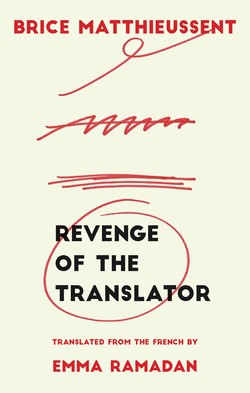Читать книгу Revenge of the Translator - Brice Matthieussent - Страница 30
На сайте Литреса книга снята с продажи.
Оглавление*
* After the adjectives, the adverbs, and the stage directions, I have decided to delete from here on out all comparisons and metaphors. Often hackneyed, when they’re not harebrained or incomprehensible, they uselessly hinder the reader. As a result of this new ablation, my text (or rather, his text revised and corrected by my efforts: ours, then) gains even more lucidity, strength, simplicity. What would be the point of rendering that constipated prose in French when we can get straight to the point? Here is the list of those insipid flourishes, laughable or convoluted, in any case superfluous:
his iron grip and her steel gaze (sic), the blanket of the night, the song of the sirens (2 times), a voice of blue velvet (?), with the lassitude of a cat (meh), strong as a Turk from the Bosporus (!), the Trojan horse of her seduction (referring to Doris), the star of the night, like a drove of wild horses, “the Greeks enter Ilion, overthrow the throne, and climb atop” (crossed-out sentence), that exhausted and unruly beast (hope), that Bluebeard killing one after another of his prying wives venturing behind the forbidden door to satisfy their shameful curiosity; stubborn as a red donkey (?); satin-smooth (skin); the muscle of the soul (imagination); the hell of the game; as abruptly as a drop of dew slides down a lilac leaf and falls, before the leaf, suddenly lightened, straightens up (?); like a translucent petal of a red rose (ear); the cruel sting of revenge; old as the dust of roads; he collapses on top of her like poverty over the world; “ten minutes before two: shiny mustache with curled-up tips” (this one makes my hair stand on end). And finally that doubly circular pearl, which I cross out with a capital Z in a vengeful crayon: “the sun was shining, like the sinister eye of a scheming Parisian ogling the gardens of the Palais-Royal through the slight opening of her parted curtains, faded by the sun.”
Next, after careful consideration and for reasons of conciseness, I have decided to eliminate from the final text of my translation that long and yet rather beautiful digression in which the author describes the work of David Grey:
“Here the translator David Grey is confronted with the original text of (N.d.T.). He probes, carries out some tests, follows the contours, identifies the lines with the greatest slope, drills, cores, plans, and outlines, he gropes around in search of buried geological structures, the right angle of attack and of adequate ‘positioning’ as one says in certain sports. For him this text is a mining site to exploit, to bleed systematically; he has to get to work, clear the fossil forests of the printed page, these lines accumulated like geologic strata, dig the tunnels, build the mine shafts, advance the front, beat down the blocks of words, of sentences, of paragraphs to see sometimes that the heart of the deposit is elsewhere, higher, lower, farther. Sometimes, an entire tunnel collapses, forcing him to backpedal, to reorient himself, to explore new tunnels, previously unseen means of approach, to modify the tools, the point of view, the angle of attack, the stays, and even the techniques of exploitation.
“Sometimes, also, unpredictable methane explosions and murderers make entire dialogues explode, crack, or shatter misplaced voices, reduce to nothingness loves and friendships, destroy in a flash the slow formulation of an accent, of a breath, of rectifiable language tics. Suddenly, that voice rings false, the character rings hollow; careful, he’s going to implode. So everything has to start anew, there is no hope of mending anything. The translator must demolish the entire edifice of that voice, suddenly broken, condemned to a definitive muteness. In recreating it through other means, he will probably notice that other voices in the crowd, if not all of them, also need to be recreated: one methane explosion often brings about others, almost immediately, in a chain reaction, or with a delay.”
In order to offset the disappearance of all those adjectives, adverbs, stage directions, comparisons and metaphors, entire passages, and to emphasize what enhances the text—for example the number of my lines at the bottom of each page—I add the following images to my American author’s book, for through my stubborn and anonymous‡ work these lines, my images, and my presence expand like
“The afternoon shadow on the sundial
Showing that labor can demand its requital;
By the fire, who can deny it, the standard meter;
An unrolled trouser leg, after the river;
The mended boot whose heel is remade;
While he clears the table, a flunky’s pile of plates;
The half-drawn sword stick brandished in a duel;
When an elderly pianist shrinks, the piano stool;
The new tear-off calendar replacing the old one;
The soufflé when it’s taken out of the oven;
The sail at the first upturn in weather, descended;
The table before a large dinner party, extended;
The flame of the match head;
The roots of chives in the garden bed;
When its resistance breaks, the elastic umbrella fastener;
When the bed replaces the cradle, the comforter.”
(Rousselian Note)
‡ I almost wrote autonomous!
